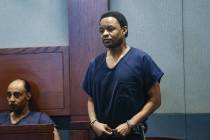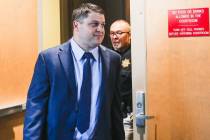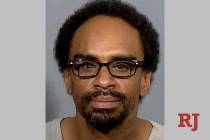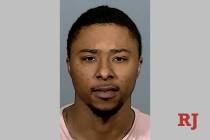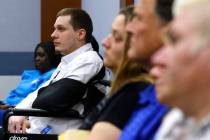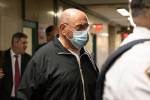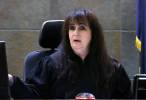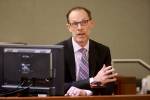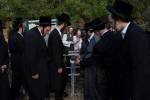Revival of coroner’s inquests in Clark County gets little support
The public would lose the testimony of one in every five participants in coroner's inquests if Clark County commissioners move forward with the hearings without the participation of the involved officers, an analysis by the Las Vegas Review-Journal has found.
The newspaper looked at all 29 inquests between 2007 and 2009, in which more than 260 people testified in deaths at the hands of officers by shootings, the use of Tasers or accidents. About 20 percent of the people who testified were officers directly involved in the deaths, raising the question of whether future inquests without their involvement would provide the public with a fair or complete picture of what happened.
Commissioners this month will have another chance to revive the quasi-legal proceeding that for four decades ruled cops' actions justified, excusable or criminal. It has been stalled because of lawsuits filed by officers who have vowed not to participate in future inquests.
On Tuesday, commissioners are expected to debate the worth of the hearings, with a vote coming at a meeting later this month. But there appears to be little appetite among commissioners to resume the process.
A key argument against reviving the stalled proceedings is: If officers don't participate, what's the point?
Examining past inquests reveals that critical testimony would be lost in future proceedings. But the process would include the viewpoints of medical examiners, civilian and officer witnesses, experts and detectives, who all combine to form a picture of incidents that are frequently chaotic and aren't often explained by just one witness.
NEW PROCESS UNTESTED
The Review-Journal's yearlong investigation into officer-involved shootings, published a year ago, included a review of transcripts of every coroner's inquest since Jan. 1, 1990.
The newspaper found a flawed process where prosecutors tasked with being "neutral arbiters of the facts" commonly act more like defense attorneys, shaping inquest presentations to cast officers in the most positive light.
Key questions were not asked, and prosecutors sometimes gave helpful prompts to officers but not to civilian witnesses.
In early 2011, commissioners adopted changes that would allow a lawyer, representing the family of the deceased, to ask questions of witnesses alongside a prosecutor.
That prompted police to file lawsuits claiming the inquests violated their due process rights. There hasn't been a hearing since.
But the Nevada Supreme Court recently disagreed with the officers' position - with a slight change, inquests could go on, justices wrote.
Commissioner Chris Giunchigliani has been the only commissioner to say publicly that she wants to proceed with the nearly 20 inquests outstanding.
Despite its flaws, the new process has yet to be tried, Giunchigliani said. And just because officers don't participate doesn't mean the process should be scrapped altogether.
But if the past is any guide, future inquests could include huge gaps.
Between 2007 and 2009, two inquests had only three participants, including the officer involved in the person's death.
For example, in the 2008 death of Ryan Rich, a 33-year-old doctor who had a seizure on the freeway and died during an altercation with a Nevada Highway Patrol trooper, only the medical examiner, a civilian witness and the trooper who used a Taser on Rich were called to testify.
A jury ruled the death excusable.
Although it remains unclear whether the trooper's actions killed Rich, the officer's testimony was critical to understanding what led up to the death.
On the other hand, those types of cases were relatively rare. Over the three years, an average of nine people testified during inquests.
In some of those cases, such as the 2007 death of Denise Glasco, there were enough civilian witnesses that officer testimony wasn't critical to understanding the basic facts of the incident.
Glasco, 24, was shot by two Las Vegas police officers after trying to break into cars stopped in traffic along Martin Luther King Boulevard and lunging at officers with a knife. She was found to have PCP in her system.
Fifteen people testified at the inquest, including the two officers who shot her, the medical examiner who performed her autopsy, three cops who witnessed the shooting and nine civilian witnesses.
The civilians, collectively, witnessed nearly the entire incident, from the 14-year-old girl who witnessed Glasco "tripping" at her house hours before, to the bus driver who saw her shot twice.
They all seemed to corroborate the officers' accounts of the shooting.
The inquest jury unanimously ruled officers' actions justified.
RIGHTS OF OFFICERS AS WITNESSES
The newspaper's analysis did not include one certain point of contention: whether officers who witness another officer's shooting must participate in an inquest.
If they don't have to participate, future inquests would lack the testimony of at least two in five people who participated in the past.
Officers who shoot and kill a civilian could plead the Fifth Amendment against self-incrimination.
But it's unclear whether officers at the scene who don't shoot would have that right.
The state's largest police union, the Las Vegas Police Protective Association, says officers do have that right. But their argument is shaky.
Under changes enacted by Clark County commissioners, future inquests would not include verdicts of justified, excusable or criminal; they would have findings of fact, such as whether Glasco, for example, lunged at officers with a knife.
And while officers everywhere are rarely charged with a crime for civilian deaths, charging witness officers for the crimes of their peers is virtually unheard of.
No matter what happens, District Attorney Steve Wolfson believes there should be some public process. He already has gone further toward public disclosure of the incidents than district attorneys in the past by criminally reviewing the shootings and issuing a decision letter afterward.
"I am in favor of some sort of process that is more than ... what is happening now, which is no inquests and decision letters from my office," Wolfson said last month. "Some sort of forum where a police detective and a district attorney makes public what happened."
Any vote this month will likely be split among the commissioners. In early 2011, when they approved the changes, Commissioners Steve Sisolak and Tom Collins voted against them. And other commissioners have been noncommittal to the process recently.
"It's an emotional issue," Commissioner Lawrence Weekly said. "We all have to be accountable to the public in some way."
Advocates on both sides of the issue, including the police union, which is against the inquest, and the NAACP of Las Vegas, which is for it, lobbied commissioners last week.
Giunchigliani fears that there just might not be much interest in resuming the controversial process.
"I get that sense, and if it's right, I'll be very disappointed," she said.
Contact reporter Lawrence Mower at lmower@reviewjournal.com or 702-383-0440.
Deadly Force: When Las Vegas Police Shoot, and Kill
Las Vegas Review-Journal investigative series










